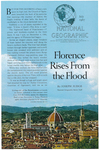Florence recalls epic flood heroics
Today is the day, 40 years ago, when the city of Florence awoke to a terrible deluge:
Mud Angels swarmed to city in '66 to save priceless heritage(ANSA) - Florence, November 1 - At 5am on November 3, 1966 the skies over Tuscany opened and poured non-stop for 18 hours, causing an unprecedented artistic, economic and human disaster. The River Arno burst its banks, flooded the city and claimed 29 lives.
Mud and water swamped the museums, churches and libraries of the birthplace of the Renaissance, ruining many great works.
The damage caused was incalculable. But it was a fraction of the devastation the city would have suffered without the efforts of thousands of young volunteers who came from all over Italy and from abroad to save the art treasures and help Florence off its knees.
This week Italy is recalling the disaster and the efforts of those volunteers, nicknamed the 'mud angels', who did so much to limit its impact.
Over 2,000 of them are returning here to take part in some of the 100 events marking the 40th anniversary of the flood. These include a mass in Florence's Duomo in honour of the victims, which US Senator Ted Kennedy and Culture Minister Francesco Rutelli will attend on November 4. There are a number of concerts and exhibitions, including a show at Palazzo Vecchio of shots of the wreckage and the rescue work by Life magazine photographer David Lees.
All week Italian television has been broadcasting reports and documentaries remembering the events of 40 years ago.
One of the most fascinating clips features British actor Richard Burton making a public appeal for help. He made the appeal in perfect Italian, even though he could not speak the language, brilliantly repeating lines he had been drilled. "Florence needs us all because she belongs to the world," said Burton, who was in Italy with Elizabeth Taylor, his wife at the time. "Everything we can do, we will do, so that this city, which we all need so much, comes back to us".
Burton was also the narrator of a documentary on the disaster by Florentine film and theatre director Franco Zeffirelli, which will be screened here on November 5.
Zeffirelli said that November 4 1996 was a "very happy date" for him.
"It seems a crazy thing to say but on that day I was witness to an incredible Florence," Zeffirelli added.
"In a situation of extreme hardship, the Florentines threw themselves into the mud to put the city back on its feet.
"It shows how a city can pick itself up from a horrendous situation".
Among the masterpieces to be saved by the mud angels was the wooden Crucifixion by Florentine painter Cimabue (1240-1302), considered the last great artist of the Byzantine tradition. Experts managed to restore the priceless work, even though the fury of the flood water which swept into the Basilica di Santa Croce had wiped off most the paint. Another illustrious local, Wanda Ferragamo - the wife of celebrated footwear designer Salvatore Ferragamo and the president of the company he set up - also remembers the flood well.
"The power of the water was so strong that it swept away everything in its path and our company s shoes were found kilometres away days later," she said. "Ours was not an isolated case. The city's shopkeepers wept that day, when the Arno seemed to have taken away the future. Many people cried, but not in front of the TV cameras. "Rather than wasting time complaining, all the Florentines rolled up their sleeves, showing strength of spirit, solidarity, civic responsibility and, above all, love for the city".
Flood protection of the historic centre of Florence, which was declared a UNESCO World Heritage Site in 1982, has since been beefed up by a series of dams, civil-engineering projects and the construction of higher embankments in the city.
But experts warn that more still needs to be done to make the city and the surrounding area totally flood-proof.
Comments:
Last update:
What's New?
-
New Mud Angels Video
Dec 11, 2020
-
54th Anniversary of the Florence Flood
Nov 1, 2020
-

Florence Rises From the Flood, Page 4 & 5
Nov 4, 2017
Top experiences in and around Florence:
Some links to external websites may be affiliate links (hotel bookings, guide books, activities, etc.). Using these services helps to support our efforts here with no additional costs to the user (you!).
